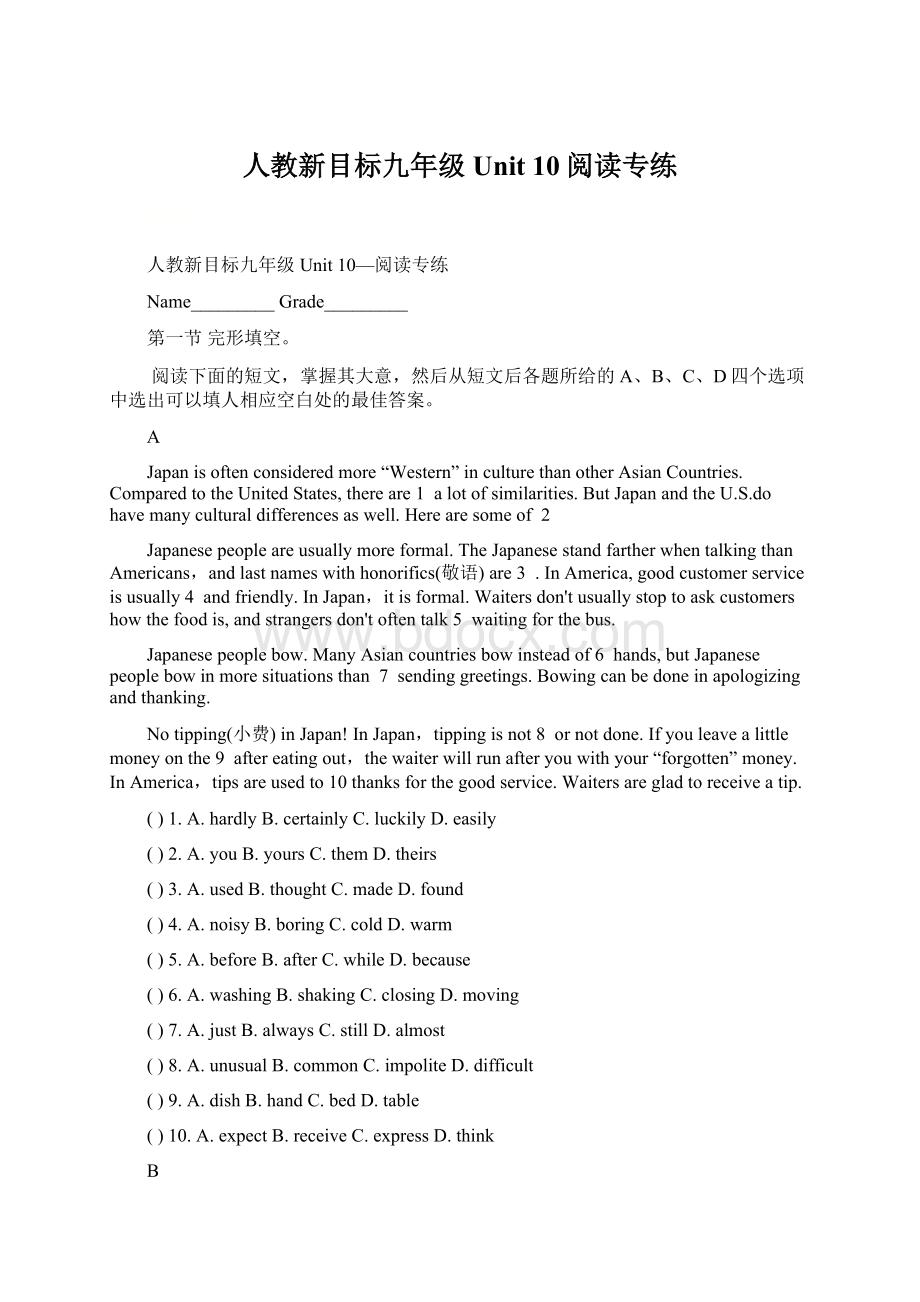人教新目标九年级Unit 10阅读专练.docx
《人教新目标九年级Unit 10阅读专练.docx》由会员分享,可在线阅读,更多相关《人教新目标九年级Unit 10阅读专练.docx(9页珍藏版)》请在冰豆网上搜索。

人教新目标九年级Unit10阅读专练
人教新目标九年级Unit10—阅读专练
Name_________Grade_________
第一节完形填空。
阅读下面的短文,掌握其大意,然后从短文后各题所给的A、B、C、D四个选项中选出可以填人相应空白处的最佳答案。
A
Japanisoftenconsideredmore“Western”inculturethanotherAsianCountries.ComparedtotheUnitedStates,thereare1alotofsimilarities.ButJapanandtheU.S.dohavemanyculturaldifferencesaswell.Herearesomeof2
Japanesepeopleareusuallymoreformal.TheJapanesestandfartherwhentalkingthanAmericans,andlastnameswithhonorifics(敬语)are3.InAmerica,goodcustomerserviceisusually4andfriendly.InJapan,itisformal.Waitersdon'tusuallystoptoaskcustomershowthefoodis,andstrangersdon'toftentalk5waitingforthebus.
Japanesepeoplebow.ManyAsiancountriesbowinsteadof6hands,butJapanesepeoplebowinmoresituationsthan7sendinggreetings.Bowingcanbedoneinapologizingandthanking.
Notipping(小费)inJapan!
InJapan,tippingisnot8ornotdone.Ifyouleavealittlemoneyonthe9aftereatingout,thewaiterwillrunafteryouwithyour“forgotten”money.InAmerica,tipsareusedto10thanksforthegoodservice.Waitersaregladtoreceiveatip.
()1.A.hardlyB.certainlyC.luckilyD.easily
()2.A.youB.yoursC.themD.theirs
()3.A.usedB.thoughtC.madeD.found
()4.A.noisyB.boringC.coldD.warm
()5.A.beforeB.afterC.whileD.because
()6.A.washingB.shakingC.closingD.moving
()7.A.justB.alwaysC.stillD.almost
()8.A.unusualB.commonC.impoliteD.difficult
()9.A.dishB.handC.bedD.table
()10.A.expectB.receiveC.expressD.think
B
DearLinda,
Howarethingswithyou?
Iwasquitegladto11youbyphoneyesterday.
AsItoldyou,IaminRometoday.LetmetellyousomethingabouttheplacesmyfriendsandIhavevisited.WestartedinEnglandandwe12twodaysinLondonandonedayinCanterbury.Wesawalotofgreathistoryandtheonlybadthingwasthe13—itrainedallthetimewhenwewerethere.Luckily,14whenwegottoParis,itwassunny!
We15stayedinthecenterofthecityforonemorningbecausemyfriendswantedtovisitParisDisneylandwhichisintheeastofParis.
Well,IhavetosayI16AmericanDisneyland.ButinParisDisneylandwemetsomenice17fromCanada.Oneofthem,Clive,willstudyinyouruniversitynextyear.Cliveandhiswife18uswhenwegottoGermanybytrain.TheywenttoDenmarkbutwewenttoMunich.Afterthat,wewenttoSwitzerland.Stayingtherewasvery19sowecouldn'tstaythereforalongtime.That'swhywe'reinItalynow!
OK,that's20fortoday.
Bestwishestoyou!
Pleasewritebacksoon.
Yours,
Mike
()11.A.talkwithB.lookforC.dependonD.dropby
()12.A.forgotB.spentC.wastedD.disliked
()13.A.planB.guideC.weatherD.traffic
()14.A.overandoveragainB.atleastC.insilenceD.ontheonehand
()15.A.alsoB.sometimesC.alwaysD.only
()16.A.hateB.meanC.preferD.fear
()17.A.studentsB.couplesC.actorsD.people
()18.A.educatedB.leftC.doubtedD.met
()19.A.easyB.comfortableC.expensiveD.different
()20.A.unbelievableB.allC.remainingD.fair
C
Todayitisquitenaturaltofindpeopleshakehandsinsomesituations.Peopleallovertheworldshakehandsformanydifferent__21__.Weshakehandswhenwemeetnewpeople__22__duringspecialfestivals.Playersoftenshakehandsbeforeorafter__23__.Businesspeopleshakehandswhentheymakeadeal.
Whydopeopleshakehands__24__shakingfeet?
Thisisbecauseofthefactalongtimeagomostpeople__25__knivesorguns.Ifsomeofthemdecidedthattheydidnotwantto__26__,theywouldshowtheiremptyhands.__27__peopleshookhandssothattheycouldnot__28__knivesinthesleeves(袖子).Lateron,hand-shakingbecameasymbolof__29__.
Nowwedon'thaveto__30__withgunsorknives.However,peoplestillshakehandsallthetime!
Thereasonissimple—itisstillawaytoshowfriendship.
()21.A.ideasB.reasonsC.thoughtsD.excuses
()22.A.orB.asC.butD.so
()23.A.gamesB.speechesC.exerciseD.programs
()24.A.suchasB.aswellasC.insteadofD.togetherwith
()25.A.lostB.boughtC.caughtD.carried
()26.A.cheatB.fightC.dropD.speak
()27.A.PerhapsB.HappilyC.CarefullyD.Luckily
()28.A.hideB.liftC.pullD.push
()29.A.successB.victoryC.prideD.peace
()30.A.talkaboutB.worryaboutC.knowaboutD.learnabout
第二节阅读理解。
根据短文内容,从每题所给的A、B、C、D四个选项中选出最佳答案。
A
Dinnercustomsaredifferentaroundtheworld.IfyouareaguestinGhana(加纳),thisinformationwillhelpyoualot.
InGhana,dinnerisusuallyfromfourintheafternoontosixintheevening.Buttherearenostrictrulesabouttime.Wheneveraguestarrives,afamilyoffersfood.Whenyougotoahome,thepersonwhoreceivesgueststakesyoutothelivingroomfirst.Atthistimeeveryonewelcomesyou.Thenyougotothedinningroom.Thereyouwashyourhandsinabowlofwater.Allthefoodisonthetable.
InGhanayouusuallyeatwithyourfingers.Youeatfromthesamedishaseveryoneelse.Butyoueatfromonesideofthedishonly.Itisnotpolitetogetfoodfromtheothersideofthedish.Afterdinner,youwashyourhandsagaininabowlofwater.
MostmealsinGhanahaveadishcalledfufu.PeopleinGhanamakefufufromthepowder(粉末)ofsomeplants.Sometimestheycutthefufuwithasaw(锯子)becauseitisveryhard.Youmustchewfufuwell,oryoumaygetsick.Youeatfufuwiththefingersofyourrighthandonly.
()31.FromthepassageweknowthatinGhana________.
A.therulesfordinnertimearenotstrict
B.dinnerisalwaysatsixintheevening
C.afamilyoffersfoodonlyatfourintheafternoon
D.peopleusuallyinvitetheirgueststodinnerlateintheevening
()32.IfyouareadinnerguestinGhana,thehostalwaystakesyouto________.
A.thediningroomfirstB.thelivingroomfirst
C.thekitchenfirstD.thegardenfirst
()33.PeopleinGhanausuallyeat________.
A.fromonesideofadishtotheotherB.fromtheothersideofthedish
C.withtheirfingersD.withtheirspoons
()34.Infact,mostdishesinGhana________.
A.arecookedwiththepowderofsomeplantsB.havefufuinthem
C.aretoohardtoeatD.arenotveryhard
()35.Whenyoueatfufu,you'dbetter________.
A.cutitwithasawB.useyourrighthandonly
C.chewitwellD.alloftheabove
B
Thomasburpedloudlyatthetable.Dadlaughed.Grandmashookherhead.“Thomas”Momshouted,lookingatherhusbandangrilyaswell.“Unlessyouwanttostarteatingfoodfromadogbowl,Isuggestyoufindsomemanners.”
“Likewhat?
”Thomasasked,puttinghiselbowsonthetable,
“Youshouldn'tputyourelbowsonthetable.”
Thomasdidn'tknowwheretoputhisnapkin.“Thenapkingoesonyourlap,”MomOrdered.Thomasdidwhathismothersaid.ButthenhestartedthrowingfoodintohisMouth.Speedeatingwasfun.Helikedtoseehowmuchhecouldgetintohismouthatonce.
Momlaughed,“Stop.Tryusingafork,sittingup,andclosingyourmouthwhenyouchew(咀嚼).”
“Thenittakesforevertoeat,andIwanttogoandwatchTV,”Thomassaid.
“Youshouldstayandhaveadiscussionwithusuntilwearealldonewithourmeals.Eatslowlyandneatly,andthenhelpmecleanthedishes.”“But…”Thomasbegantoprotest(抗议).
“Doyouwanttouseadogbowl?
”Momsaid.“No,thankyou,”Thomassaidsoftly,whichmadeGrandmasmile.
Momsmiledasheliftedhisfoodcarefullytohislipsandchewedwithhismouthclosed.“Excellent.Youmightstillmakesomeoneagoodhusband.”
Dadclearedhisthroatandateneatly,too.Buthewasn'tpraised.
()36.WhatdidThomasdoatthebeginningofthestory?
A.Heputhiselbowsonthetable.B.Heputhisnapkinonthetable.
C.Heburpedloudlyatthetable.D.Hechewedwithhismouthopen.
()37.WhichofthefollowingisNOToneofthemother'ssuggestions?
A.Chewwithyourmouthclosed.B.Useaknifetocutyourbeef.
C.Situpstraight.D.Putyournapkinonyourlap.
()38.Whatdidthefatherdoattheendofthestory?
A.Heatenicely.B.Heleftthetable.
C.Heburped,too.D.Hefellasleep.
()39.Whatisthestorymainlyabout?
A.Aparty.B.Afilm.C.Tablemanners.D.Greetingmanners.
C
Differentcountrieshavedifferentcustomsingivingpresents.
InChinayoumustnevergiveaclocktoaChineseperson,becausethesoundofthewordfor“clock”issimilartothesoundof“death”.Also,don'twrap(用……包裹)apresentinwhite,blackorbluepaper,becausetheyarethecolorsforfunerals(葬礼).Don'tgiveaknife,becausesomethingsharpcancutafriendship.
InRussiaifyougiveflowersaspresents,youhavetogiveanoddnumberofthem(one,three,five,etc.)becauseevennumbersofflowersareforfunerals.
InGermanyifyouareinvitedtodinner,flowersaregoodpresentstotaketoyourdinnerhostess,butdon'ttakeherredrosesbecauseitmeansyouareinlovewithher.Don'ttakethirteenofanythingbecauseit'sanunluckynumber.Don'ttakeanevennumberofanything,either.Don'twrapyourpresentsinwhite,brown,orblackpaper.
()41.Accordingtothepassage,______mustneverbegiventoChinesepeopleaspresents.
A.flowersB.clothesC.foodD.clocks
()42.Peopledon'twrappresentsinblackorwhitepaperin________.
A.GermanyB.China
C.bothChinaandGermanyD.bothChinaandRussia
()43.Whatdoestheunderlineword“even”meaninChineseinthepassage?
A.偶数B.奇数的C.甚至D.平坦
()44.WhatpresentscanyoutaketoyourdinnerhostessinGermany?
A.Thirteenofsomething.B.Flowersexceptredroses.
C.Anevennumberofsomething.D.Somethingwrappedin